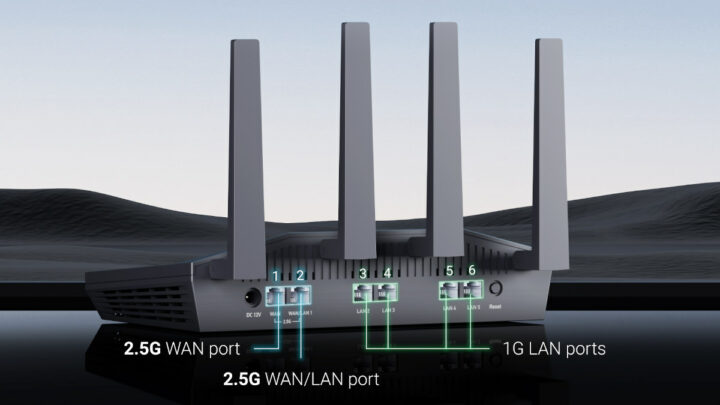GL.iNet Flint2 (also known as GL-MT6000) is a new AX6000 router based on MediaTek MT7986 (Filogic 830) Arm SoC and supporting VPN speeds of up to 900 Mbps using WireGuard and 190 Mbps with OpenVPN.
This caught my attention, as I previously covered other GL.iNet routers such as the Spitz AX (GL-X3000NR) and the Beryl AX (GL-MT3000) based on the previously generation Filogic 820 (MT7981B) CPU with claims of (only) 300 Mbps transfer rates with Wireguard, so the new model is supposed to triple the VPN performance.
GL.iNet Flint2 (GL-MT6000) specifications:
- SoC – MediaTek MT7986 (Filogic 830) quad-core Arm Cortex A53 processor @ 2.0 GHz with hardware acceleration engines for Wi-Fi offloading and networking
- System Memory – 1GB DDR4
- Storage – 8GB eMMC flash
- Networking
- 2x 2.5 Gbps Ethernet ports
- 4x Gigabit Ethernet LAN ports
- 802.11b/g/n/ac/ax WiFi 6 with 4x external Wi-Fi antennas
- Up to 1,148 Mbps @ 2.4 GHz
- Up to 4,804 Mbps @ 5 GHz
- DFS (Dynamic Frequency Selection) support
- VPN – OpenVPN server/client tested up to 190 Mbps, and WireGuard server/client tested up to 900 Mbps (tests over Ethernet in client mode)
- USB – 1x USB 3.0 Type-A port
- Misc – Reset button and dual-color LED for power and Internet
- Power Supply – 12V/4A via DC jack (5.5/2.1mm)
- Power Consumption – < 20W
- Dimensions – 233 x 137 x 57mm (plastic enclosure)
- Weight – 761 grams
- Temperature Range – Operating: 0 ~ 40°C; storage: -20 ~ 70°C
- Certifications – CE, FCC, RoHS, MIC, WEEE, SRRC
The router ships with OpenWrt 23.05 (or more likely a fork) with Linux 5.15 and GL.Inet Admin panel common to all their routers. It works in four different network modes: router, access point, extender, and WDS, and supports the usual features found in the company’s routers including AdGuard Home, parent controls, and Cloud remote management.
The tripling of the WireGuard performance is really impressive, and even switching from a 1.3 GHz dual-core Arm Cortex-A53 CPU to a 2.0 GHz quad-core Cortex-A53 should not explain it all. The big performance boost only happens on WireGuard, and OpenVPN is faster too but nowhere near in terms of percentage gains (190 Mbps vs. 150 Mbps). The main reason might be that the Filogic 820 routers shipped with Linux 5.4, and the new Filogic 830-based router comes with Linux 5.15 gaining in-kernel WireGuard support that was introduced in Linux 5.6. As a side note, the first Flint router delivers up to 500 Mbps with Wireguard.
While it’s the first time we write about an actual router using the Filogic 830, it’s the same processor as found in Banana Pi BPI-R3 and BPI-R3 Mini router SBCs. GL.iNet has not disclosed pricing yet since the Flint2 router should only become available in the next few weeks, but you can already find additional information and/or register your interest on the product page.

Jean-Luc started CNX Software in 2010 as a part-time endeavor, before quitting his job as a software engineering manager, and starting to write daily news, and reviews full time later in 2011.
Support CNX Software! Donate via cryptocurrencies, become a Patron on Patreon, or purchase goods on Amazon or Aliexpress. We also use affiliate links in articles to earn commissions if you make a purchase after clicking on those links.






The Filogic 830 processor can also be found in routers such as the Redmi AX6000 and ASUS TUF-AX4200.
It’s not all about the SoC though, it’s about how it’s being utilised and what hardware features the router maker implements.
The TUF-AX4200 is a pretty meh implementation, didn’t bother looking at the Redmi.
The website says now that the wireguard performance is only up to 500 Mbps, only via Ethernet and only if the device is the client, not the server. So this doesn’t seem to represent tripling of the performance at all. (well, the top of the page says 900 and the bottom says 500)
No, it compares the old version to this version at the bottom of the page, where the old one could do 500 Mbps and this one does 900 Mbps.
Oh! Ok, on the phone I just saw the left side of the table lol
This has to be cheaper than the Asus ROG Rapture GT-AX6000 to be interesting.
Is OpenVPN inherently more CPU intensive? 190Mb/s seems low for a quad core A53–less than 50Mb/s/core. Does it not parallelize or something? Might be better off with a dual core A7X series processor core.
No, it appears most of it is related to it just being old and slow as a piece of code. There have been people looking at fixing it, but it’s simply too much code to fix for it to be “fixable” so to say.
This is pretty much why WireGuard exists.
Ahh, okay, I understand that. Thanks.
Can this one be used as an extender to my existing ASUS AP RT-AX58U?